#analysis series
Text
I'm really wondering about the order of events we learn of in "The Midnight Star" (MS) poem if only because some pieces of language aren't quite meshing with what we've previously known / potentially assumed
Elarion, trembling seed,
lay down to earth in icy night,
and in the cold
her roots took hold
defying winter’s deathly bite.
Elarion, fading bloom,
afraid to wilt and dim and die,
she searched the dark
for but a spark
and caught the dragons’ hungry eye.
We know Elarion was an early human settlement that eventually became the biggest in ancient Xadia (TOX). We know that this is happening prior to the stars leaving thanks to a later stanza. Moreover, this stanza indicates that the city was drawing the attention of the dragons, which is also hinted at in Ripples, "It happened long ago, when humans had only just learned to hold fire in their hands without burning. They nurtured their precious primal flames secretly—in the dark of night, beneath shadows and shrouds—as cultivating its glow drew the eyes and ire of monsters".
However, Elarion suffering and struggling to hold on doesn't quite make sense if it already had primal magic... unless the first stanza condenses these events, i.e. "she searched the dark for a spark" ("that secret becomes a spark, the tiniest flicker of a primal source inside you") and that's why the city initially caught negative attention from the dragons. But even then, that contradicts statements from Ripples, in which:
"he did not know the stars as I know them. He did not know their arrogance, how they had rejoiced to look down upon their newborn sea. Where once they’d watched errant flames burn with pride and undeserved power, there was now only stillness"
the Startouch / First Elves are the ones who — seemingly — cast Aaravos out and create the sea as an initial punishment for humanity because "humanity had been given something they were never meant to have."
But MS doubles down that it's the dragons threatening the city, and that humans are still assuming the First Elves might help them, only for the stars to refuse and leave:
Elarion, frightened waif,
reached bone-white branches to the night,
the stars she asked
their light to cast
and stop the dragons’ fiery might.
Elarion, unworthy whelp,
Wept as the stars turned black the sky,
They donned their masks
They turned their backs,
And left Elarion to die.
So Elarion/humans have been given primal magic by someone, who is probably Leola, a unicorn who may or may also be a startouch elf even though the First Elves disapproved (TOX, book 1: novelization). This makes the other First Elves angry and also seems to anger the dragons. When Elarion asks for protection from the First Elves against the dragons, they're ignored/abandoned.
This is, however, where MS starts to get tricky.
Elarion, dying husk,
did wilt and whimper in the dark,
‘till the last star
Reached from afar
His touch: a blaze, a gift, a spark.
Again, we see a spark, which has most been referred to in reference to primal magic, even seemingly earlier on in the poem. We also see gift, which seems like a blatant reference to dark magic: "So he gave us magic!" (4x07) and "Lay [the staff] down? But it was a gift" (3x01). We can also read it into this section from the Puzzle House in which Claudia quite explicitly uses magic that isn't primal, either:
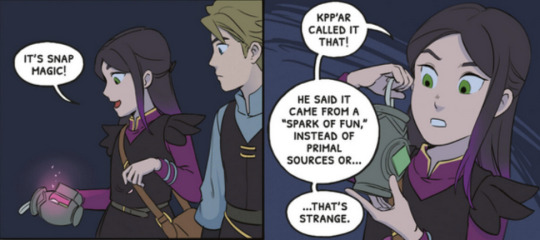
He said it came from "a spark of fun" instead of primal sources, or...
And Kpp'Ar is a dark mage, and so is Claudia (in-training at this point), so it'd be within reason to assume this is some form of dark magic residue. But if it is... why not just call it that? Why make the distinction?
I think we can conclusively say there were at least two gifts given to humanity — the first was primal magic, and this seems to be more concrete. The second, assumedly, was dark magic at least in some form. But what if it was also more than that? I've talked before that as the Key of Aaravos seemingly functions now, it'd be most useful to a dark mage for categorizing spell parts/ingredients. The premonition dreams and weird blood connections between Star (Deep?) and dark magic are well known by now, even just looking at the sheer weirdness of whatever the fuck is going on with Ziard-Viren's relic staff.
The Midnight Star poem also does not help us much in figuring out the distinction between them, at least not at first glance.
Elarion, searing white,
Embraced the great one’s night-black flame.
And when she bowed,
Her faith avowed,
He whispered, “Aaravos,” his name.
Here, we get the dark-light motif pretty plainly. Fire fits with the primal flames that we're pretty sure humanity already had at this point, but we're not 100% sure. "Searing white" seems to match up with Aaravos' key, which could both relate to primal, dark, and deep magic all pretty easily.
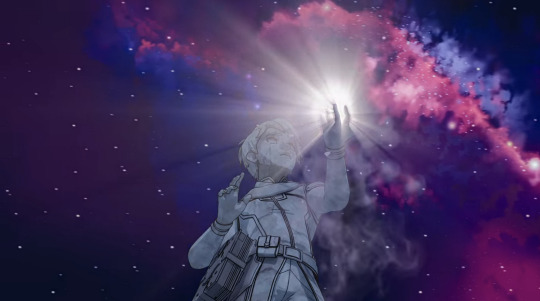
And giving humans deep magic isn't necessarily all bad. Elarion is called "a beautiful white city" nestled in the mountains (Tales of Xadia). Leola's Last Wish star is a beautiful guiding light. This is probably the closest to a straightforward "this is when humans got primal magic or deep magic ('good' variant)" we can read into the poem, except...
It's immediately troubled by this implication and the following stanza (said connection between 2x06 and TOX found by @its-leethee).
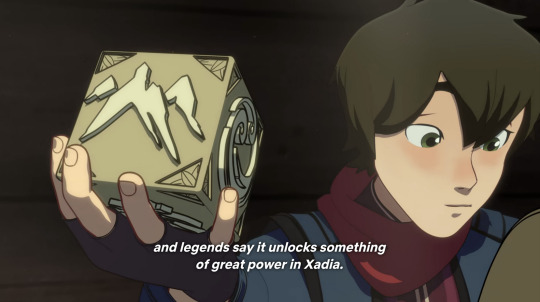
The process marks its wielder, too: years of dark magic leave mages with pale complexions, bruise-like blemishes across the body, and blackened eyes. For better or for worse, dark magic became the key that unlocked a place of power in Xadia for all of humanity.
The closing stanza of the poem is why we all thought dark magic post-S2, for obvious reasons:
Elarion, black-eyed child,
her twisted roots spread deep and far,
The humans’ might
sparked by the light
of Aaravos, her midnight star.
Black eyes are found in dark magic use, twisted roots don't have a particularly good connotation, and we know thanks to S1 and S3 that many humans considered dark magic to make them powerful and level the playing field. Thus, the timeline would look something like this:
Elarion / humans eventually found primal magic (thanks to Leola + potentially others like Aaravos)
This drew the anger of the Stars/First elves and the dragons
Elarion asks the stars for help against the dragons, but they leave/reject it
Aaravos gives the humans deep magic (or something along those lines) through his cube ("searing white") which may or may not contain his chest piece / a quasar diamond
Through the cube, humans discovered/developed dark magic, thus "unlocking a place of great power"
#elarion#deep lore dive#tdp#the dragon prince#analysis series#analysis#predictions#yeah this is the Timeline to me#i didn't expect to land on the key in this manner per se but#it's the only thing that makes sense to me (at least for now)#the key of aaravos#it also makes sense bc the key opens up power in that case (dark magic) but also locks you in (to aaravos)#yeah. yeah yeah yeah
43 notes
·
View notes
Text
as a lifelong ATLA fan who narrowly had ATLA dethroned as my top show by The Dragon Prince steadily over the past 5 years, the similarities between the two have very little to do with the surface level parallels that get regularly drawn between them.
Like ATLA, TDP has Books for seasons and chapters for episodes, but unlike ATLA, which only touched on storytelling sparingly as a theme, TDP is obsessed with interrogating storytelling and history and the presence of unreliable, biased narrators throughout many of its episodes (most notably 2x05, 2x06, 3x06, 4x04, and 4x07 among them). Half of what you learn in the 1x01 intro ends up being a lie once you reach S3, with more being steadily deciphered.
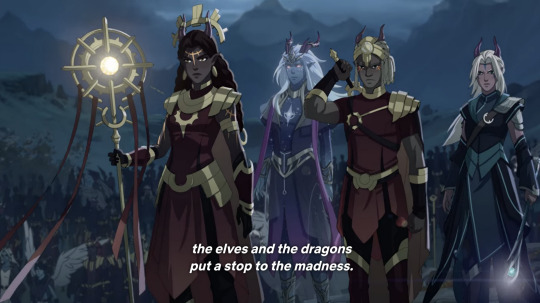
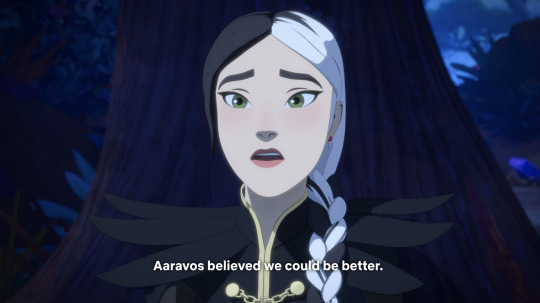
Yes, TDP has different magics with people living under those umbrella terms... for the elves. Humans are coming culturally at things from a completely different angle, and the elves' connection to their primal sources are discussed philosophically in detail, informing their practices and their culture first hand, including the way they chafe against humans, who are arcanum-less. Many animals in the world are also connected to magic, which influences both their design and which ones get hunted for humans' more 'clever' solution in dark magic, including each other.
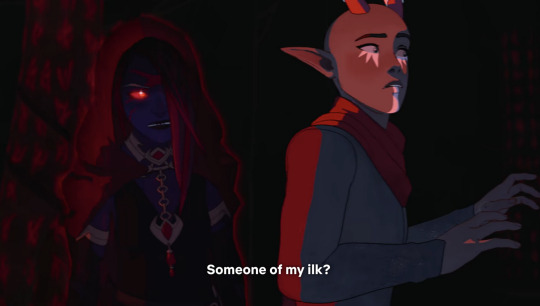
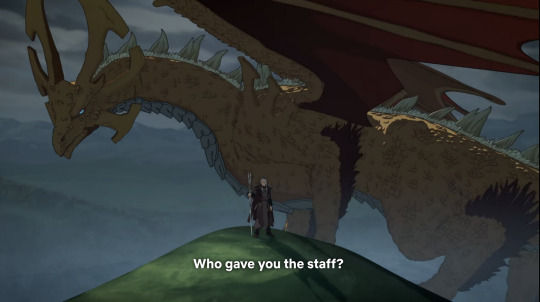
The core issue of the Puppetmaster, down to being a coercive magic formed by someone deeply resentful of their imprisonment? Said puppetmaster is the main endgame antagonist of the entire show with all of S4 onwards being exploring the ethics of controlling people against their will in various methods, and the entire show itself being a thematic battleground of fate (imprisonment) vs free will for virtually every single character.
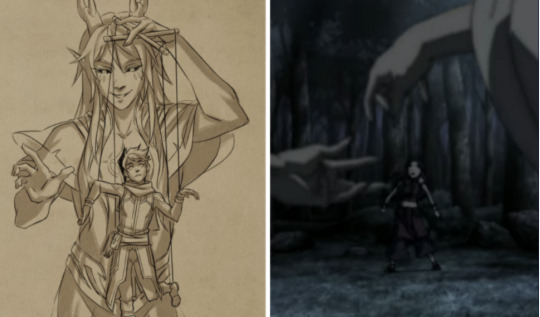
Where ATLA mostly concerns itself timeline wise with ending the war, very little thought is shown by any of the characters as to what they'll do after the war. This isn't a problem (as it reflects the sheer domineering scope of the conflict) but even Zuko being firelord is only ever really addressed with 2.5 episodes left till the finale. TDP, meanwhile, ends its 'war' in s3 and s4 opens up with dealing with the old wounds festering between people with centuries of history, the struggles that come when people aren't able to let go and believe they're safe or mourn in a healthy manner, and the religious/cultural clashes that may occur when trying to integrate different groups of people.
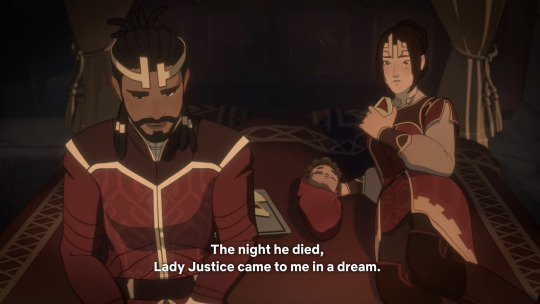
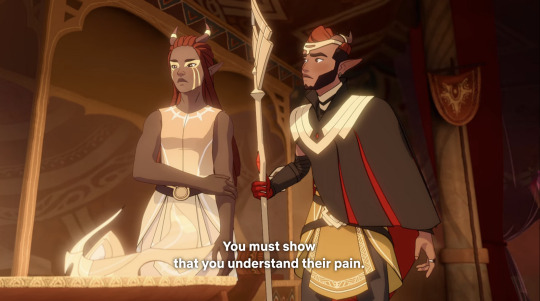
TDP also has an evil father with a devoted daughter and a brother who eventually defects, but it explores the reality of an abusive parent who loves/will sacrifice for you and your right to leave regardless, even if that means leaving the sibling you truly deeply love and who loves you in turn. Which means that when you and your sibling are on opposite sides of a deep ideological conflict, it actually really fucking hurts bc we've seen first hand just how much they love each other and also how and why everything fell apart not in spite of that love necessarily, but also because of it.
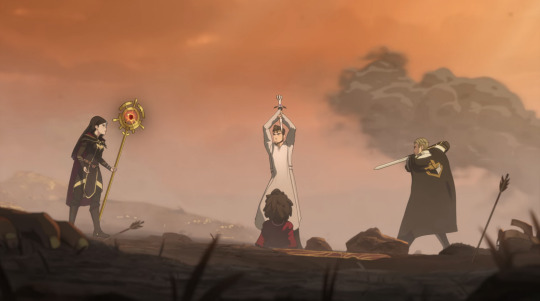
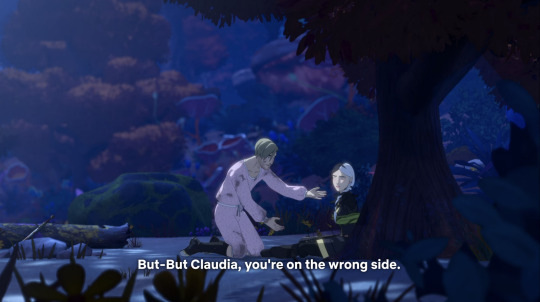
Is this to say that TDP is a 1:1 with ATLA or that it's better? No, not at all, and the latter is subjective. I prefer TDP, but I think they're about on equal ground when you look at each show currently as a whole (although TDP has two seasons left to go).
But TDP takes a lot of what ATLA was doing thematically with some of its most interesting beats and then builds or expands upon them further. It talks further and more consistently about the cycles of violence; in many ways, Jack De Sena's character, Callum, begins the series largely where Sokka had ended (and he's not the most like Sokka anyway; very much his own thing); we get Faustian bargains and centuries' long grief and fucked up people who are trying both succeeding and failing at not doing fucked up things. There are antagonists, but it is very hard to actually label anyone at this point a straight up villain. Moral greyness is where the show starts, and it just continues from there.


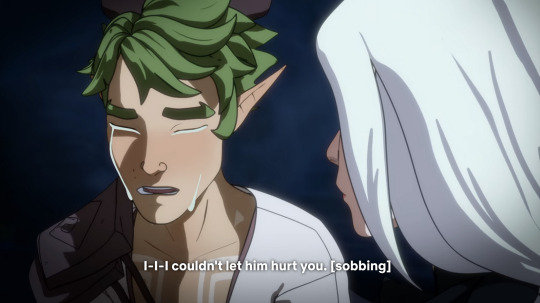
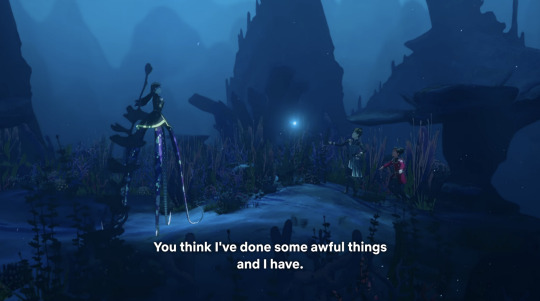
That's not to say the show is nothing but dark and depressing - like ATLA, there's a steady thread of hope and humour even as the show gets steadily closer and closer to its 11th hour point - but the show is usually emotionally heavier. There's more blood and potentially disturbing imagery with body horror and on screen death. There's so much foreshadowing you basically can't go more than 5 minutes into any episode without having something that's going to come back around or be referenced again like 3-5 seasons later.
Just to be clear - TDP is like ATLA, but it's like ATLA in interesting ways beyond the more shallow surface level that usually gets attributed to it, while still very much being its own show and its own thing. And that is why I tend to recommend it to people who like ATLA.
Thank you and goodnight
(Also, the fandom doesn't have any ship wars, and the show is queer as fuck)
#tdp#atla#the dragon prince#avatar: the last airbender#mine#parallels#analysis series#also betrayal. tdp talks a lot more about betrayal#now im trying to think if there's any character in tdp who hasn't felt or been outright betrayed#i. DON'T THINK SO??#atla meta#tdp meta
394 notes
·
View notes
Text
It’s time we accept that Percy Jackson is an unreliable narrator. He’s not dumb. He’s just insecure. He’s not clueless about his and Annabeth’s feelings. He’s just in denial. He’s not clueless about Rachel’s feelings. He just doesn’t want to do anything about them. His mother isn’t perfect. He just loves and respects her more than anyone in the world. That boy contradicts his own inner monologue all the time. Do not trust him!!
EDIT: Please don’t interact just to disagree. You can make your own post.
#if anything proves this it’s the og text. but heroes of Olympus and the tv show made it even more obvious.#queued#percy jackson#percy jackson and the olympians#pjo#pjo books#pjo tv show#pjo tv series#pjo spoilers#pjo adaptation#percabeth#percy jackon and the olympians#riordanverse#heroes of olympus#percy jackson analysis#i guess
20K notes
·
View notes
Text
Sorry, your boyfriend got reincarnated. Yeah, he doesn’t remember that time you murdered him with your bare hands. He doesn’t know how much you love him. He doesn’t know that you’ve killed for him. He doesn’t know that you’ve killed him. He doesn’t know it’ll happen again. As he takes your hand and your heart, and you laugh from atop an animal the two of you ride together, he doesn’t know you’ve been here before. He doesn’t know it’ll happen again.
#in order we got: llama. horse. panda? llama. camel#sorry for trafficshipping it’ll happen again#scarian#hermitshipping#<- ig??#idk they’re /p in my mind but I have no way to justify that lmao#traffic series#life series#third life#last life#double life#limited life#secret life#grian#goodtimeswithscar#nerdy’s traffic analysis#poetry#?
4K notes
·
View notes
Text
To add to the discussion on the portrayal of Judaism in Knuckles: This may be some children’s introduction to Judaism. This has been intentionally orchestrated by imperialist aligned media to sell an image of Judaism as explicitly Zionist, it does nothing to highlight our diverse cultures, our traditions or our hidtory outside of our Struggle. The media constantly depends on reminding not only Jews but goyim that we have suffered for centuries; there is no celebration of our life, our arts, our peoplehood. Just reminders of the Holocaust and brutality we have endured for the crime of existing. You must ask yourself, is that not intentional? The State of Israel needs our pain to survive, for it’s only (and weakest) justification is “we have nowhere else to go”. Media reinforced this by informing everybody that nobody likes us. It raises Jewish children scared and defensive and dependent on Zionism, and it raises Goyim to pity or hate us more.
Media programming is intentional. There is always an ideology to be sold, and right now, it’s the defiling of Judaism to replace it with Zionism.
#zionism#antizionism#media#analysis#media analysis#knuckles series#anti capitalism#anti imperialism#anti zionist jews
1K notes
·
View notes
Text
Me: *reading a post that makes the joke “Peeta dropped the baby bomb, Gale drops bombs on babies”* haha good one
Also me: you’re missing the point! You’re missing the point! YOURE MISSING THE POINT! He grew up starving. His best friend almost died of hunger. Most of his people live in poverty. He watched children die in a bloodbath every year for the capital’s entertainment. The girl he loved went into the games. Was tortured by the capitol. His district was bombed out of existence. Nearly everyone he knew was killed. Their only crime was being fed up of being hungry and oppressed and sharing the same district as Katniss. All those innocent people. Murdered. He had to take refuge in a district that was bombed out of existence and forced to live underground. Of course he joined the war effort. Of course he designed unethical bombs and battle tactics. He wanted revenge. He wanted the capitol to have a taste of their own medicine. He wanted the rebellion to succeed. And tell me you could live through what he did, and that no part of you would be screaming for Justice and vengeance. Gale is you. You are Gale. He represents a part of feelings and actions that reside within us, even if you don’t act on it.
“But he killed prim!” Exactly! Gale loved prim. She was a second family to her. He looked after Katniss’ family. He saved them from the district 12 bombings. He loved her. He never would’ve put her in danger. He never would’ve put in order for a bombing if it would kill Prim. But coin would. And did. She took what was meant to be a tool of Gale’s righteous revenge for all the suffering he and his people suffered through, only for someone in power to take it and use it to kill someone he loved.
There’s some many lessons to take. We can’t control the things we create. War spares no one. Even justifiable rage and actions can end up rebounding and hurting those you love instead of your targets.
“He drops bombs on babies” is too simplistic of a takeaway and does a disservice to the story and Gale.
#end rant#the first few times I laughed#now I’m getting tired of seeing the same joke again and again and again#i get it#Peeta is the best boy and you’ve been shipping everlark since the books came out#but please stop ignoring the themes and messages I beg you#Gale didn’t even order the bombing 😭#the hunger games#thg#thg series#thg analysis#thg gale#gale#katniss everdeen#peeta mellark#gale hawthorne#mine#primrose everdeen#everlark#abosas#the capitol#district 12#district 13#president coin#president snow#hunger games
2K notes
·
View notes
Text
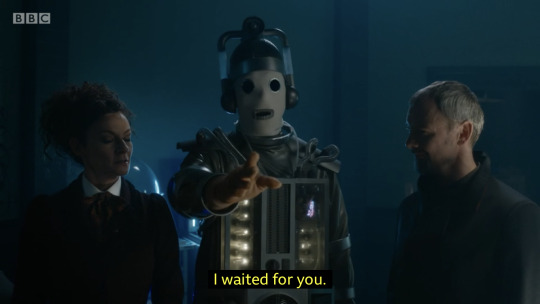
the composition of this shot... finger pointed at the doctor in accusation, bill is speaking the words but both masters are talking through her, surrounding her as witnesses as she channels their bitterness, their rage, their abandonment. the master waited for him. jack waited for him. older amy in that hospital waited for him. bill waited for him. ashildr-me waited for him. but he always came back too late. the man whose ship's engine noise is a sound that heralds hope wherever it lands left the ones he cared about behind. when hope itself leaves you behind, what redemption could you ever dream of?
#doctor who meta#world enough and time#bill potts#simm master#missy#twissy#thoschei#jamie catches up#twelve#twelfth doctor#tenth doctor#doctor who series 10#doctor who#dw#jamie.txt#doctor who analysis#tensimm
1K notes
·
View notes
Text
reminder that the only reason the "ADHD is actually demigod BATTLE STRATEGIES" and "dyslexia is DEMIGOD BRAINS HARDWIRED FOR ANCIENT GREEK" things exist in the PJO universe is because it's a very direct reference to early 2000s teaching/parenting techniques for neurodiverse and disabled children, which aimed to frame childrens' disabilities and hardships as a "superpower" or strength so that the children would feel more positively about their disabilities or situations. This technique has fallen out of favor since then for the most part since more often than not it just results in kids feeling as though their struggles are not being seen or taken seriously.
Yes, demigods are adhd/dyslexic (and sometimes autistic-coded) in the series. This is extremely important and trying to remove it or not acknowledge it makes the entire series fall apart because it is such a core concept. Yes, canon claims that their adhd/dyslexia is tied to some innate abilities, which is based on an outdated methodology. It's important to acknowledge that and understand where it comes from! But please stop trying to apply it to other pantheons in the series like "oh, the romans have dyscalculia because of roman numerals!" or "the norse demigods have dysgraphia for reasons!" - it's distasteful at best.
A better option is to acknowledge the meta inspiration for why that exists in the series, such as explaining potentially that Chiron was utilizing that same teaching methodology to try and help demigods feel more comfortable with their disabilities and they aren't literal powers. In fact, especially given Frank, there's implication that being adhd/dyslexic isn't a guaranteed demigod trait, which means it's more likely to be normally inherited from their godly parent/divine ancestor as a general trait, not a power, and further supports the whole "ADHD is battle strategy" thing being non-literal. It also implies the entire greco-roman pantheon in their universe is canonically adhd/dyslexic - and that actually fits very well with the themes of the first series. The entire central conflict of the first series fits perfectly as an allegory about neurodiverse/disabled children and their relationships with their undiagnosed neurodiverse/disabled parents and trying to find solutions together with their shared disability/disabilities that the kid inherited instead of becoming distant from each other (and this makes claiming equivalent to getting a diagnosis which is a fascinating allegory! not to mention the symbolism of demigods inheriting legacies and legends and powers from their parents and everything that comes with that being equivalent to inheriting traits, neurodiversity, and disabilities from your parents).
anyways neurodiversity and disability and the contexts in which the series utilizes representation of those experiences particularly during the 2000s symbolically within the narrative is incredibly important to the first series and the understanding of what themes it means to represent. also if i see one more "the romans have dyscalculia instead of dyslexia" post in 2023 i'm gonna walk into the ocean.
#pjo#riordanverse#percy jackson#analysis#meta#adhd#dyslexia#also this symbolism recontextualizes the relationship between demigods and their godly parents so much#particularly Percy and Poseidon and the whole ''I'm sorry you were born thing'' like DAMN that's an ENTIRE DIFFERENT IMPLICATION#honestly in general the first series' meta analogy of being a demigod as symbolism for being neurodiverse/disabled ROCKS SO HARD#that's SO COOL and im SO SAD NOBODY EVER TALKS ABOUT IT#i could write a whole essay on that alone like COME ON GUYS#can we PLEASE ACKNOWLEDGE THIS I WANNA TALK ABOUT THE COOL DISABILITY METAPHORS....#anyways i didnt proofread this cause. re: dyslexia so if it doesnt make sense dont worry about it#i can try to explain further in supplementary posts if people so wish
2K notes
·
View notes
Text
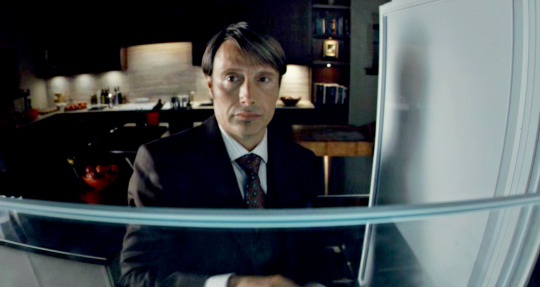

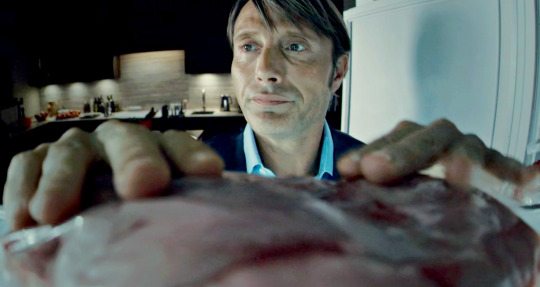
they shot these scenes in the funniest ways imaginable lol. also the music playing in the bg is tragically (and hilariously) on point.
Faust, Act II: Le veau d'or: "The erudite Faust is highly successful yet dissatisfied with his life, which leads him to make a pact with the Devil at a crossroads, exchanging his soul for unlimited knowledge and worldly pleasures. Faust and the adjective Faustian imply sacrificing spiritual values for power, knowledge, or material gain. Along the seductive path to riches and power, Faust realizes his salvation is tragically bound to others, including those he loves most."
#i could prob do a whole series just on the music in hannibal#hannibal#hannibal memes#hannibal meta#hannibal shitpost#hannibal crack#hannibal lecter#hannigram#music#nbc hannibal#sorbet#memes#meta#faust#media analysis#kennedy center#wikipedia
2K notes
·
View notes
Text
Ofc Spock is alienated, and it’s a beautiful and heart wrenching conflict, but I think Kirk’s alienation in TOS is just as fascinating.
Kirk can’t have long term romantic relationships because he is Captain. He refuses to get with people on his crew who he has direct control over (in the context of Spirk I believe that this would also cause him to hesitate in forming a relationship with Spock) and of course all other relationships would be long-long-long distance.
Jim’s romances are also often ruses; it’s not often that he seems to truly fall in love with a woman as opposed to simply seducing her in order to gain an advantage.
Jim has to be forced by Spock and McCoy to relax; he also seems to have told no one about either his traumatic experience on Tarsus IV, or his traumatic experience with the spooky evil fog. This seems to me to show a reluctance to show weakness.
Jim loves his position as captain and would do (almost) anything to maintain it.
I also see Kirk as fairly calculating; he is able to put emotion aside to make difficult choices (as in The City on the Edge of Forever). Kirk, while personable, is a fairly Vulcan human.
All of these things, I believe, show that Kirk probably feels lonely and alienated. I think this is why he understands Spock so well — they are able to find in each other the solace they lack everywhere else. Kirk can trust that Spock won’t be manipulated by him because of Spock’s Vulcan strength and logic; Kirk doesn’t have to worry about Spock attempting to gain power because Spock does not want command.
Jim struggles with loneliness and alienation. Boom.
#star trek#tos#star trek: the original series#k/s#spirk#james t kirk#Captain Kirk#Jim Kirk#character analysis#Spock
3K notes
·
View notes
Text
And honestly?
I love that Viren’s moment of refusal was with a creature he didn’t really care about.
In his dream flashbacks, we see him walk through almost every meaningful relationship in his life - his king and ‘brother’ and possible victim in Harrow; Soren, back before their relationship was fractured and afterwards, and Claudia of course, following in his footsteps; Kpp’Ar, the man who helped him learn dark magic in the first place and who he coined for unknown but suspected reasons - save for his wife, whose absence speaks volumes, I think, in the levels of isolation Viren has routinely felt. (“Tell no one. Not even Claudia. You must carry this weight alone. It won’t be easy, but you are strong.”) Stoic, strong, lonely, y’know? And these dreams highlight Viren’s willingness to do whatever it takes for the people he loves, no matter what. We also saw in S4 that he wasn’t particularly engaged in living beyond the set 30 days; happy to be alive, yes, but Claudia was still primarily the one pushing their mission forward.
But I don’t think it’s an accident that when Viren rejects dark magic, he also rejects the dehumanization - the de-personalization - of a creature that would be very easy to depersonalize. Because that’s what dark magic inherently is, either dehumanizing yourself or others in order to commit the acts you deem necessary. or both.
If his moment of refusal had been about someone he loved, it would’ve been about love, not the morality of it - and morality is what he’s always, arguably, needed more of, at least in that way.
It had to be a magical creature, a non human, a monster - that he saw as a person, or innocent (which Claudia is not), if nothing else, and refused to sacrifice it for his own gain. That’s the point.
#tdp viren#s5#5x09#viren#analysis series#s5 spoilers#tdp spoilers#the dragon prince#dark magic#sir sparklepuff#sparklepuff squad
681 notes
·
View notes
Text
I think the biggest difference for me between projects (like to be clear I think NATLA is not good as an adaptation or a show, and I think the PJO tv show works as an adaptation and a show) is something that feels so basic, but shocked me when it clicked, which is that
NATLA has no actual visual storytelling going on
Which sounds ridiculous, but let me explain what I mean. "Visual storytelling" is how you communicate aspects of character or relationship through visual framing, parallels, that kind of thing, usually to indicate progression or a character's viewpoint. Many people have noticed that NATLA's cinematography leaves much to be desired, there are some shots that are good particularly in episode 6 (the Zuko transition shots between past and present, and one of the ending shots between him and Aang) but that's by and large the exception.
What I mean when I say "visual storytelling" is that NATLA doesn't have visual motifs. It doesn't really have parallels happening that much in the text or in the visuals. And this is something that ATLA did really, really well, all the time, particularly with Zuko's scar. Just take this framing of Zuko and Aang, in particular, from The Storm and The Blue Spirit.

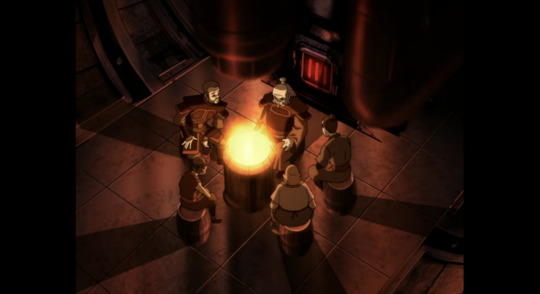
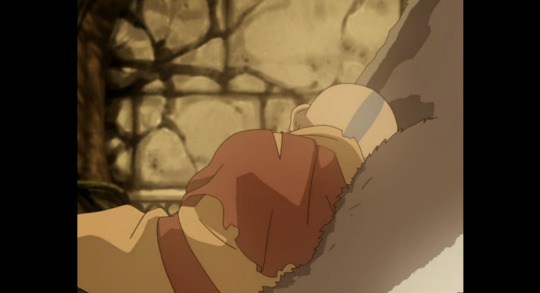

They even have consistent colour tones of Aang having a warmer, lighter yellow (Air Nomad) and Zuko having a darker, deeper red (Fire Nation).
And this is something I think Percy Jackson does pretty well. They have consistent motifs / descriptions if it were, particularly when it comes to Percy and Annabeth's relationship and her character.
Percy: [Choosing Annabeth] And if the mission required someone to push me down a flight of stairs for it to succeed, you want someone who won't hesitate when they do it.
Percy: [literally pushes her down the stairs but to save her life]
Ares: You're new to the family, young one, so let me fill you in on how we work. [...] Olympians fight. We betray. We backstab. We will push anyone down a flight of stairs to get ahead.
Annabeth: This isn't the Arch, Seaweed Brain. You're not pushing me into the stairwell aagain.
Percy: Yes I am! [...] It's why you're here. When I was choosing my team, I told Chiron I needed someone who wouldn't hesitate to sacrifice me if the quest required it. He agreed. That was you. [...] You're better at this than me. You just are.
Annabeth: [Refusing to get back in Athena's good graces] It isn't how it should be! It isn't. Eat or be eaten [referencing the Kronos story Ares said earlier]. Power and glory and nothing else matters. Ares is that way. Zeus is that way. My mother is that way. He isn't that way. He's better than that. Maybe I was that way once. But I don't wanna be that way anymore. I won't be like all of you. I just won't.
But we also see this visually.
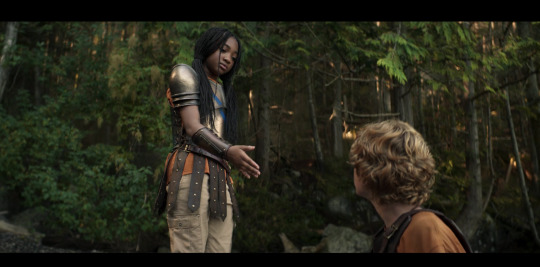


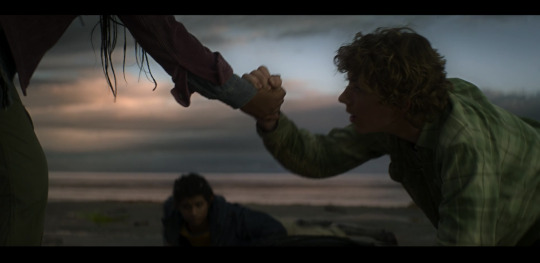
And to be clear I think it's well done, I'm not saying this kind of thing is a Masterpiece™ but what I am saying is that if you do these things, it's a great way to convey information to your audience visually and a sense of progress both in individual characterization and relationship development. And it just makes sense to lean on things visually if you're a visual medium, because prose can't do framing like this to the same degree.
And NATLA just... never does it. There's almost no real parallels, there's very little framing happening, and the even more intense overload of exposition does not help matters in this way either. The original series had a lot of parallels steadily built up (i.e. Aang's presence in the SWT and Sokka's plotline in Jet -- hell, even some of the lines he gets at Roku's Fire Sage temple -- were to show how Sokka was moving away from a more xenophobic worldview even if it was still a work in progress). There were also more overt ones, such as Sokka dressing himself for battle versus Zuko having guards/servants do it for him, but both ultimately tether the two together into having to put on a performance of confidence, manhood, and war more so than being the children they actually are.
And NATLA just has... no real visual parallels. The closest we get is the parallels between Sokka-Yue, Tui and La, and Kataang in the finale, but that's about it.
There's not a lot of scenes where a character is presented the chance to make a similar choice only to then make a different one. Even Aang wanting to go to the NWT to make a difference is muted because he never actually ran away in the first place; when you rip away character flaws or mistakes, you also gut their room for growth. When you strip away visual storytelling, it means that what you see on screen is a 1:1 of exactly what you're getting, and that is just a lot more Boring to watch as well as gutting your chances to show more character exposition. And it's just - it's just not good
#natla critical#natla#pjo tv show#the one that kills me the most is when hahn is like 'you have something the rest of us don't [in fighting the FN]: experience'#and it's like. sokka has not fought zuko or barely any firebenders since the pilot#the only other time his fighting skills got developed was with suki. also at the beginning#he has not done basically anything since then warrior wise. nvm with the fire nation directly#analysis series#analysis#sincerely a very tired nb english major#pjo
72 notes
·
View notes
Text
There’s something about Percy spending the whole episode remembering how upset he was with his mother for separating them, but with this newfound understanding of why she did it, and then deciding to leave her (temporarily) at Hades’ palace because it’s the right thing to do, regardless of how much it hurts.
“Hold fast, Mom,” because they’re braving the storm that was made to break them.
#THEY ARE UNBREAKABLE AS LONG AS THEY HAVE EACH OTHER#percy jackson and the olympians#percy jackson#pjo#pjo tv spoilers#pjo tv show#pjo tv series#pjo adaptation#pjo disney+#sally jackson#Pjo ep 7#Pjo 1x07#we find out the truth sort of#pjo analysis#-ish
3K notes
·
View notes
Text
can we talk about how crazily devoted to his team joel "is eternally lonely in every life series" smallishbeans is to the bad boys?
screeching YOU CAN'T TAKE OUR GRIAN!!! and panicking the second anything happens to him? shoving people off bridges and threatening them after they try and attack jimmy? that incredibly smooth disarming of a tnt minecart and his absolute rabid kill on martyn after he stole grian? plus the way he was visibly restraining himself from killing people after getting turned back green was so funny.
he's absolutely batshit insane and devoted to a goal and it's so interesting to see that single-minded focus turned on protecting a group of people.
#sorry im a little crazy on life series joel#joel smallishbeans#smallishbeans#limited life#bad boys#limited life smp#trafficblr#life series#jimmy solidarity#grian#og post#mcyt#mcytblr#analysis#ig?
4K notes
·
View notes
Text
So let’s go through this one-by-one, shall we?
Red Guy
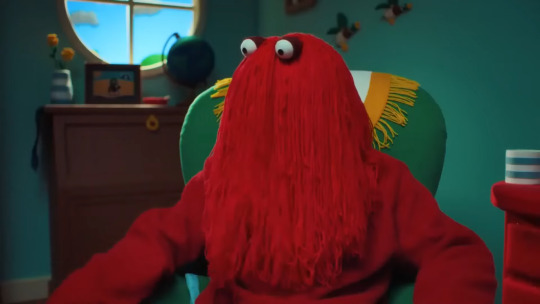
Flat affect in voice, not very expressive

Or from the perspective of other Red Guy, he is far too expressive and tend to smile at inappropriate situations
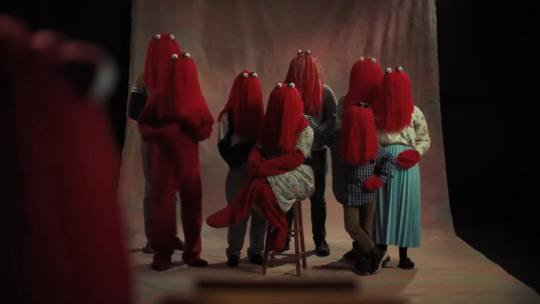
Express emotions either ‘too little’ or ‘too much’ in terms of volume, very little in-between
Speaks very bluntly
Feels physically uncomfortable with bright colors
"Well, this isn't that fun, is it? can't make out where I am in the room like this. What if I'm standing in an embarrassing area?"
"I actually don't mind it. Kind of a nice break from all of those... garish colors"
Duck
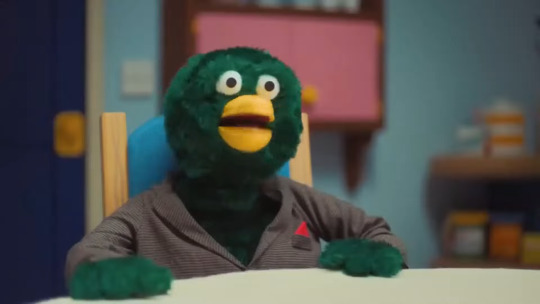
Loves cataloging and organizing things as a recreational activity
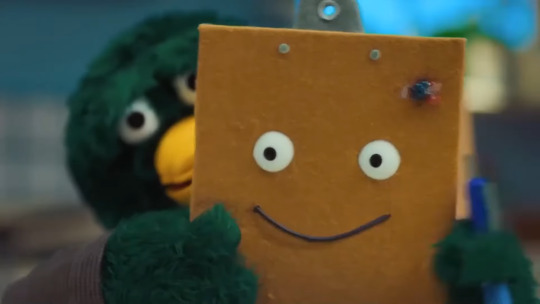
Anthropomorphise inanimate objects (like ACTUALLY inanimate, not teachers)
"You have to jab it hard or it won't respect your choices!"
Has a hard time fitting in in ‘normative’ social groups

Odd sensory sensitivities
"You're supposed to say that the floor is too loud or the window is disrespecting you"
Yellow Guy
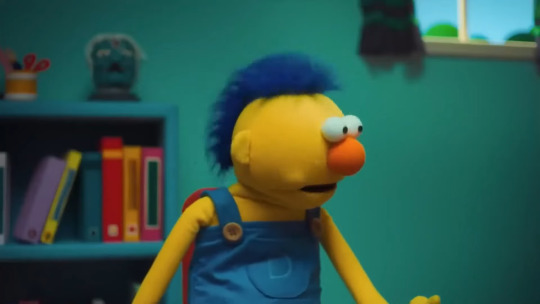
Relies on a heavy amount of social mimicry in unfamiliar social situations
"I'm making bits and parts, although sometimes I feel a bit like the bits and parts are, eh, making me."
Tends to understand metaphors and turns of phrases very literally
Which is actually a trait that he displays even in his hyper-intelligent ‘Charged’ mode
"Oh there he is, it's about time."
"Yeah, what have you been doing?"
"Um, okay, let me see... We were learning about electricity... I completed a crossword puzzle..."
Who is also very sensitive to sounds when two or more people are speaking at once
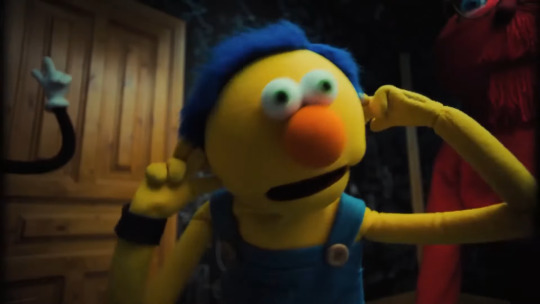
He also seems to have ‘clumsy’ motor functions in both ‘forms’

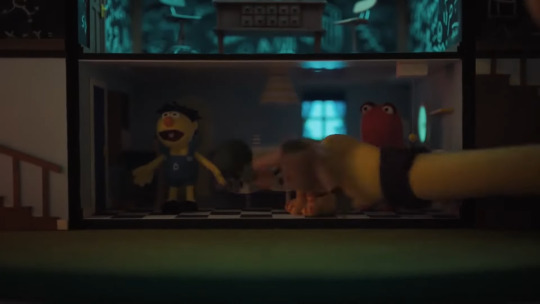
In conclusion:
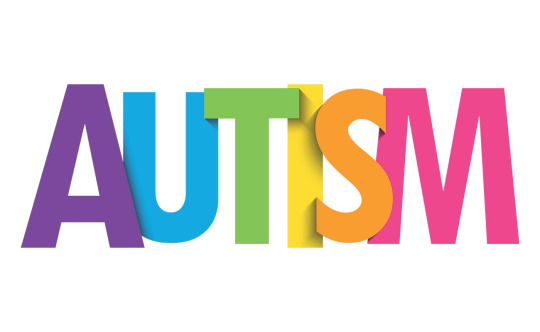
#dhmis#don't hug me i'm scared#don't hug me#i'm scared#dont hug me im scared#dhmis tv series#dhmis tv show#dhmis analysis#dhmis yellow guy#yellow guy don't hug me i'm scared#yellow guy dhmis#red guy dont hug me im scared#red guy dhmis#red guy#dhmis duck#duck dhmis#being 'fully-charged' and operating correctly just made Yellow Guy MORE autistic lol#anyways gonna write a callout post for Lesley for contrascting her Puppety Purgetory entirely out of overstimulating felt textures#actually autistic
2K notes
·
View notes
Text


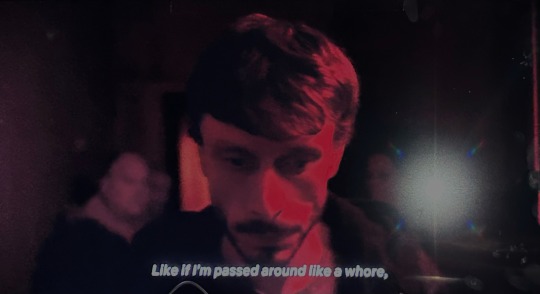

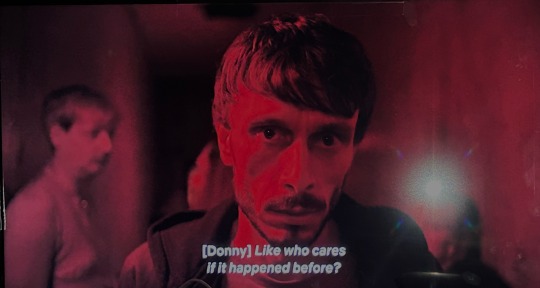
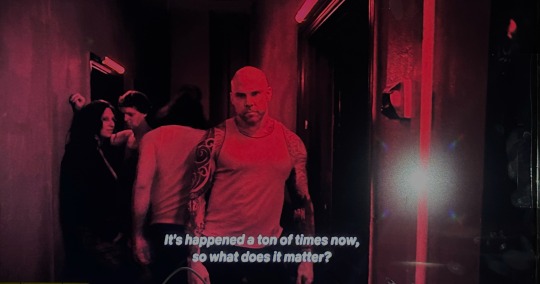

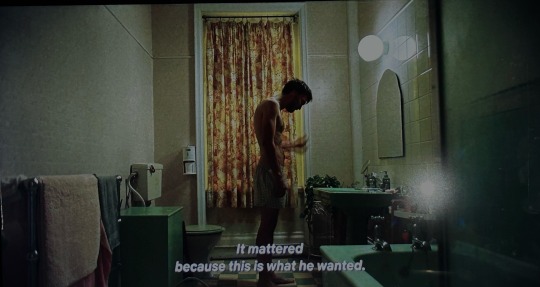


“that he’d been vindicated somehow”
#baby reindeer#sa victim#trauma survivor#tw abuse#tw rap3#rapesurvivor#rapevictim#rapeawareness#sa awareness#sexualassault#richard gadd#tvandfilm#tv series#web weaving#writerblr#scriptwriting#🤯#trauma coping#coping mechanism#movieblr#tvedit#movieedit#media analysis#cw vent#cw rap3#cw sa mention
723 notes
·
View notes